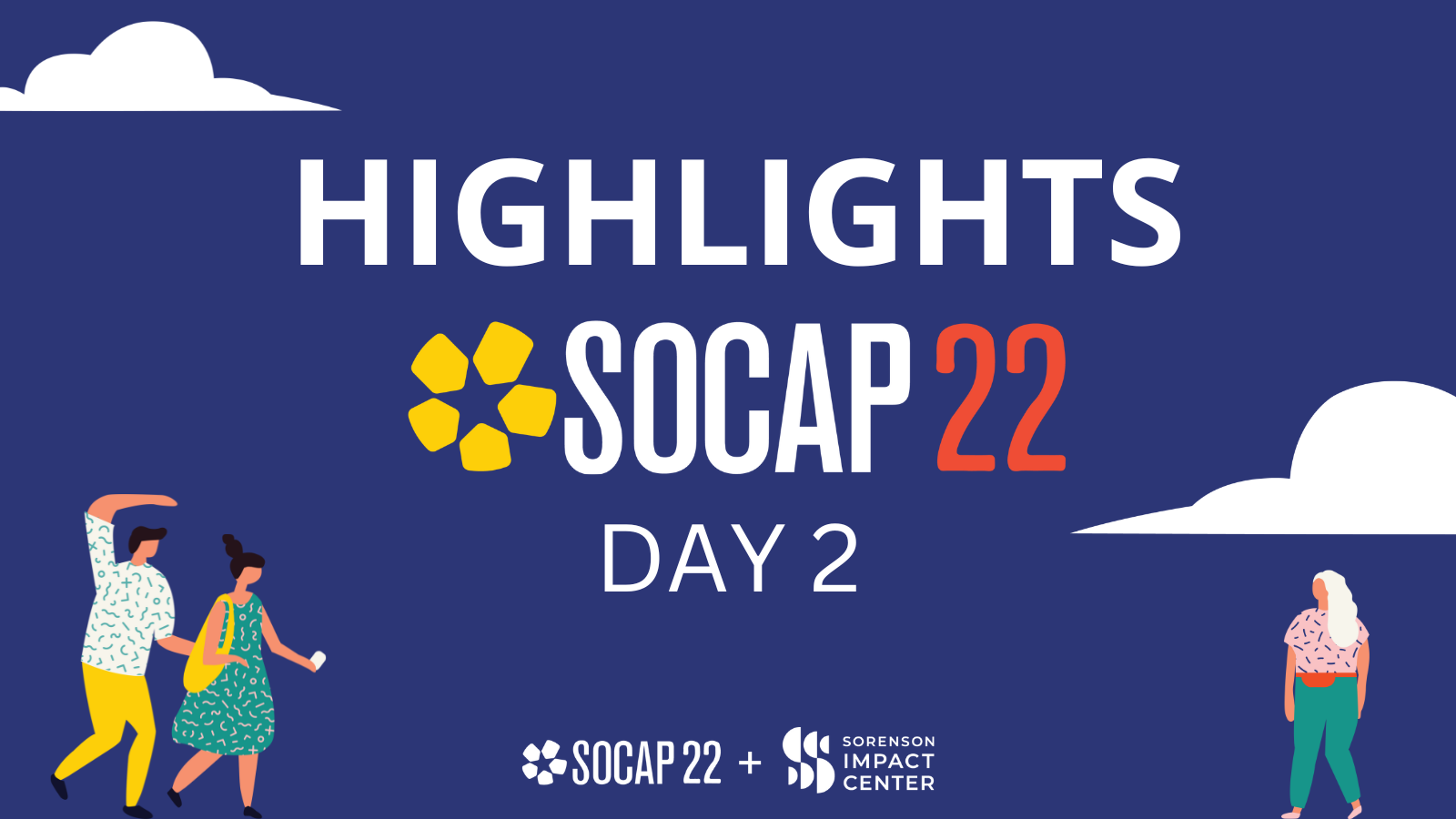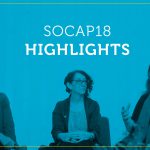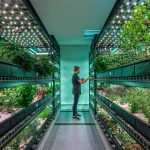Highlights from Day Two of SOCAP22
“What and who is visible? In your mind, in your lives, in your organizations, in your communities. And where do you think you might have blind spots, who or what might not be seeing?”
These questions, asked by content guide Monique Aiken of Make Justice Normal, inspired the second day of SOCAP22. The day centered on bridging silos, connecting across gaps, visibilizing the people and environments we might not see, and sharing tools and methods to widen the aperture of our work.
Regina Kline of Enable Ventures was among those who reminded attendees, “Less than 2% of venture capital is invested in female founders and entrepreneurs.” A few hours later on the same main stage, Tynesia Boyea-Robinson of CapEQ identified, “When you’re a business owner and you’re of color, frankly all of the chips are stacked against you. … 95% of Black-owned businesses are sole proprietorships, and PPP funding only went to employer firms. That 95% could not access PPP.” Y. Elaine Rasmussen of Social Impact Now challenged any excuses for these noted disparities: “I refuse to believe that 98% of women or BIPOC people who went in front of investors had a bad pitch. There’s still embedded racism and sexism that happens in investing. … For investors, what are the biases you’re bringing to the conversation?” And CJ Grimes of WorkMoney expanded the challenge to the way our democracy is built: “Democracy is supposed to do something — create an America where people can lead better lives. … That’s not what’s happening for an awful lot of folks.”
There is one guiding message: Without considering and including everyone, we won’t succeed in the change we seek. As voiced by Chelsea Peters of Walton Family Foundation, “We know that no hero can ever go at it alone. We need each other to unlock opportunity for everyone. We know that people who work closest to the problem are often the ones closest to the solutions. … Let’s get to work by working together.” And on a separate stage almost in response, Stephen DeBarry of BRONZE made this call to impact investors: “Some LP is ‘rounding down’ on folks that we need to move forward the way we want to move forward. Don’t round down on these folks; round up. The only way we’re going to get where we’re trying to go is with everybody. Please round up.”
Throughout the day, speakers shared tools they are using to work together to “round up.” Content guide Darryl Ratcliff of Gossypion Investments closed our main stage plenary by identifying the mindset shift that comes first: “How do we get from individuality to community?”
We look forward to continuing the work together with this community on Day Three.
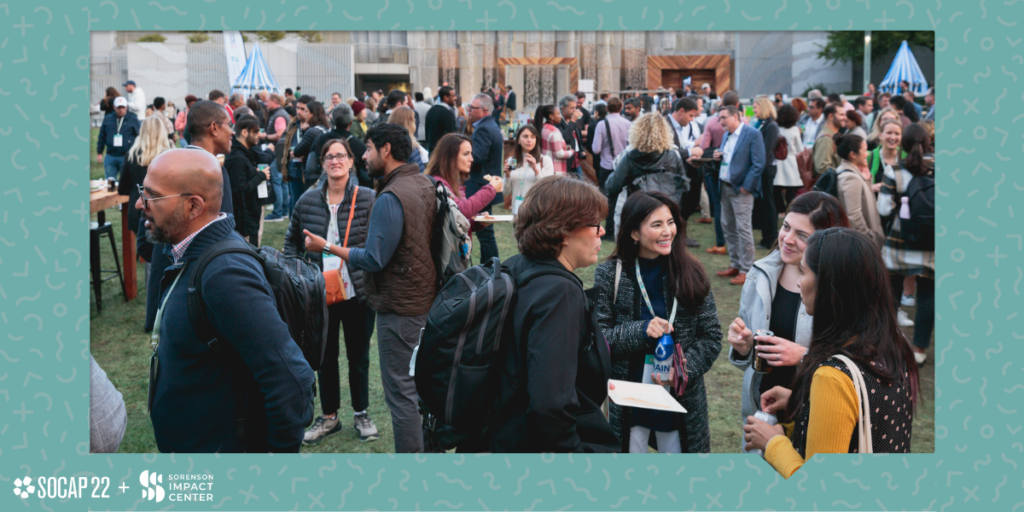
Notable Highlights from Day Two
Imagining and innovating for a new economy and a more resilient environment. Dr. Delton Chen presented the need for a Global Carbon Reward policy built on the idea that we require a parallel economy to fund climate mitigation and ecosystem services. The idea is to think like a plant, listening and engaging one of the stakeholders perceived as silent, to achieve optimal growth for the world economy by balancing global energy efficiency with global carbon safety. Dr. Chen shares it is about “managing a reward that’s scalable with an exponential response. That’s what we need at the end of the day, an exponential response to keep 1.5 (degrees Celsius) alive, which is going to be very challenging.”
Tackling systemic problems with historical understanding. Multiple speakers reminded attendees that we need to visibilize history and not shy away from examining the history of the systems currently governing our work today. In the words of content guide Darryl Ratcliff of Gossypion Investments, “What are the histories that need to get acknowledged to have the trust of communities?” As named by Michael McAfee of PolicyLink during SPECTRUM on Tuesday afternoon, “Our nation was founded with a hierarchy of human values. … Our institutions weren’t designed for a thriving multi-racial democracy. We’re a nation founded on slave labor and stolen land genocide that has never stood in account for that. … 100 million people need us to design a just and fair nation in which everyone can prosper and reach their full potential.” And history plays out in our expectations today: “Anybody approaching tribal communities from an investment lens needs to consider: Are you looking for financial returns? Because of 500 years of extraction, you already have all of the money. Your ROI is in restoring the health and wellness of our communities, which includes an entire ecology. It’s about restoring the health and wellness of Mother Earth, starting by investing in Indigenous communities,” shared Shelley Buffalo of Great Plains Action Society.
Creating public-private partnerships in response to recipient needs. In a session identifying opportunities to use underutilized public and government assets to fund community development projects, speakers Ben McAdams, Sorenson Impact Center Senior Fellow, and Jonathan Tower of Arctaris Impact Investors shared their experience in creating successful public-private partnerships. Jonathan shared, “We’ve seen failures to collaborate. Governments tried to do it alone. Private investment couldn’t do it alone. But when they do it together, you end up with a better suite of solutions. We speak a lot in terms of ‘but for,’ as in, ‘but for this collaboration, this project would have died.’” And these partnerships are maximized with effective data and data sharing, as evidenced in higher education. The MAPS project, as presented by Sorenson Impact Center’s Dr. Allison Boxer and Benedict College’s Dr. Roslyn Artis, is one example. Allison said, “Higher education needs data-driven investment; we need to equip decision-makers in higher education with tools to create a more equitable system. Investors and other partners can use MAPS data tools to ask questions and understand where investment is needed most in higher education systems. … A more equitable system is going to take investment.” And it requires thinking about who is not currently represented in data on the needs of recent college graduates, as presented by a YBCA session on reshaping narratives from the South. In the words of HBCUx co-founder Nijeul X. Porter, “HBCUx is a professional development incubator designed to rewrite the story, pipeline, and impact of artists from HBCUs. We are creating a container to fill the gap people have between graduating and moving into early careers. In terms of understanding the gaps, can you guess how many HBCUs are surveyed to get the data on impact and needs for early career artists? One, if any.”
Visibilizing entrepreneurs who are surfacing and representing new solutions. Throughout the week, multiple social entrepreneurs pitch and present their ideas for solving problems they see in the communities and environments around them, including the Cartier Women’s Initiative and Miller Center for Social Entrepreneurship cohorts. These entrepreneurs presented or participated in workshops on Day Two designed to increase funding to entrepreneurs who are often left out or to address problems unique to slower-growth yet high-impact entrepreneurs. In introducing their world cafe session to identify how to fill the funding gap for impact zebra entrepreneurs, John Kohler of Miller Center for Social Entrepreneurship at Santa Clara University identified the need to listen to entrepreneurs first: “This is not a new problem … and it’s about what is right for the entrepreneurs. It is wonderful and important to hear from them directly.” That value was echoed as an important data point in how Cartier Women’s Initiative is funding its entrepreneur cohort. “The early stage can be challenging for women entrepreneurs, yet diversity is critical to innovation. We saw the numbers getting better from research institutions showing that female-led enterprises are having a better performance. … The most important thing is to change the world, and the most important way to do that is by supporting entrepreneurship,” shared Lu Zhang of Cartier Women’s Initiative.
Dig deeper and take action on the +Media Impact Hub. You’ll find inspiring opportunities to dive more deeply into solutions related to this year’s themes, including building on the Think Like a Plant plenary conversation with Dr. Delton Chen with the Climate Change Knowledge Portal. Access global data on historical and future climate vulnerabilities and impacts from the World Bank Group. Gain deeper insights into climate risks and adaptation actions for key economic sectors. Find this and more on the +Media Impact Hub.
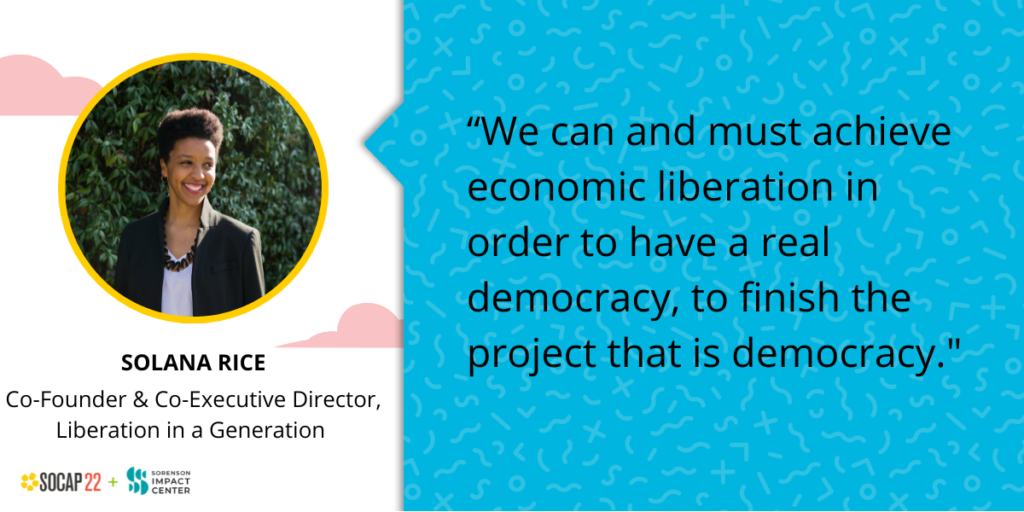
#HeardItAtSOCAP
Some powerful quotes we took away from the second day of SOCAP22:
- “We build bridges between Indigenous peoples and the private sector. … There has been intentional policy toward Indigenous peoples. It was an intentional invisibilizing. It’s the economic invisibility that persists. … When you want data, there are tribes that have that. Stakeholder engagement is the way to integrate that data.” Kate Finn, First Peoples Worldwide | Investing in Positive Outcomes Through a Human Rights Approach and Stakeholder Engagement
- “This is our responsibility to open up that space for people who don’t always get their stories heard, because communication is their disability. … We try to make them loud and clear.” Thibault Duchemin, Ava | Disability as an Asset: Closing the Disability Wealth Gap
- “We need to acknowledge the fact that racism is profitable. If we don’t have ways to hold governments accountable for distributing the resources of our talent and capital, then we can never expect racism not to be profitable. … We can and must achieve economic liberation in order to have a real democracy, to finish the project that is democracy.” Solana Rice, Liberation in a Generation | Economic Justice: A Solution to Democracy’s Biggest Challenge
- “The criminal justice system in America focuses on punishment rather than transformation. Usually when you actually embrace people, you get a better result. … We’re asking employers not to lower the bar but to lower the barriers.” Ken Oliver, Checkr | Fair Chance Hiring: Good for Justice, Good for Business
- “We are seeking to identify who are the most marginalized voices and believe that they are truly the experts in whatever issue or focus area we are working in, and making sure we are listening and receiving that and using it to inform our practices and where we situate ourselves as an organization.” Jaynemarie Angbah, EdD, Charles and Lynn Schusterman Family Philanthropies | How Philanthropy & Social Capital Can Help Advance Innovative Approaches to DEI

Meet Some of Our Partners
As we gather again in person, we’re especially grateful for the mission-driven partners who have helped to make SOCAP22 a reality — and for you and others in the SOCAP community bringing energy and ideas to fuel conversations and drive positive action. Meet some of our partners and their work below:
Jobs for the Future (JFF) announced on Tuesday the launch of JFF Ventures, a new impact investing arm that will manage funds focused exclusively on emerging technologies with the potential to improve economic mobility for low-income workers. The new investment arm marks a major expansion of JFF’s growing focus on technology investing and acceleration, building on the organization’s 2019 acquisition and incubation of the Employment Technology Fund (ETF@JFFLabs). To date, JFF has already invested in more than 35 high-impact technology startups through ETF@JFFLabs, which will become JFF Ventures Fund I. JFF Ventures will be supported by a newly-formed Corporate Innovation Council of leaders in talent management and development, investing, and corporate social responsibility who will advise tech entrepreneurs tackling some of today’s most critical challenges related to equity, inclusion and economic mobility.
W.K. Kellogg Foundation (WKKF) at leading the space using unconventional models of capital to bring about real impact. SOCAP is honored to work with WKKF to help shine a light on these models to inspire future generations of funders around the world, ensuring an equitable economy and opportunities for all. And we are excited for WKKF to be leading a conversation on impact investing at SOCAP22.
Advantage Capital is an expert in unpacking and demonstrating how to measure impact with an emphasis on economic equity and inclusion. That is why we are so excited to be partnering with Advantage Capital at SOCAP22, and are thrilled that they can bring their extensive knowledge on impact investing to the conversation.
EY is devoted to creating tools that set entrepreneurs up for long-term sustainability and success. We are thrilled that they could join us for SOCAP22. It is a privilege to have EY workshopping their tools at SOCAP, bringing their innovative ideas to our global community.
